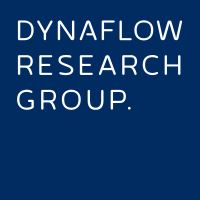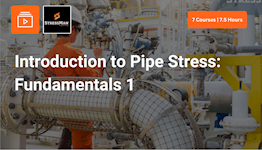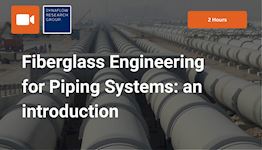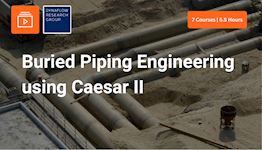Fiberglass Reinforced Plastic (FRP) Engineering for Piping Systems
Why take this course?
This self-paced course covers the fundamentals of Fiberglass Reinforced Plastic (FRP) piping design, highlighting key differences from metallic piping. Participants gain a solid understanding of material properties, behavior, and pipe stress analysis, supported by real-life examples. The course includes video lectures, quizzes, and awards a certificate with PDH credits upon completion.
What you'll learn
After these courses, you...
• have a fundamental understanding of the material and its behaviour,
• are familiar with the design of FRP pipes and joints,
• know methods for manufacturing of fiberglass products and their (dis)advantages,
• understand the qualification process for FRP products as per the ISO 14692,
• have a solid understanding of the design process and stress analysis of FRP systems.
• know the differences between steel and FRP and how this impacts pipe stress analysis,
• have seen and discussed a multitude of real• life failures, common issues and mitigation measures.
About the course
Fiberglass Reinforced Plastic (FRP) piping, also called Glass Reinforced Plastic (GRP) piping, is a cost-effective alternative to corrosion prone metallic piping and non-reinforced thermoplastics. However, the design of FRP systems requires specific knowledge as there are fundamental differences compared to the design of steel piping.
This course teaches you all the fundamentals required to design and work with FRP piping systems. After this course you have a solid understanding of the material properties and behaviour for piping systems and you understand how this impacts designs. The engineering process is demonstrated, including pipe stress analysis. Also, a multitude of real-life field examples are discussed that illustrate critical aspects of FRP systems. In this course a great deal of attention is given to practical aspects of engineering FRP systems.
The course consists of 8 online courses based on video content.
Meet your instructor
Who should attend this course
• Professionals involved with the design and realization of Fiberglass Reinforced Plastic piping systems.• Pipe stress engineers that work with FRP systems.
• People that have experience with steel piping systems and get involved with FRP systems.
Prerequisites
No experience with FRP is required,Basic understanding of (steel) piping systems is beneficial.
Program & Details
-
Welcome
1. Welcome to the course
2. Your instructors
3. How to use this course
4. Personal Certificate requirements -
Course 1 - FRP Materials and Manufacturing
1. FRP Materials and manufacturing
2. Material specifications of FRP
3. Manufacturing methods of GRP
4. GRP Application
5. Material limitations
6. Market range
7. Applications of GRP -
Course 2 - GRP Material and Strength Properties
1. FRP Material properties
2. Bi-axial materials
3. Steel versus FRP
4. Short-term and long-term strength
5. Qualification
6. GRP qualification tests -
Course 3 - GRP Code: ISO 14692
1. GRP codes
2. Overview of GRP codes
3. Philosophies in GRP standards
4. Piping code ISO 14692 -
Course 4 - Design and Analysis for FRP Systems
1. Stress analysis of FRP systems
2. Pipe stress analysis
3. Constructing a stress envelope
4. Reducing material stress
5. Surge analysis and flange assessment
6. Surge analysis for FRP piping
7. Flange assessment -
Course 5 - Underground Applications of FRP
1. Buried FRP Piping
2. Pipe stress analysis
3. Ring strength calculations -
Course 6 - FRP Failure Theory & Product Qualification
1. Material failure theories
2. GRP material strength
3. Failure criteria
4. Ultimate Elastic Wall Stress
5. Material qualification
6. Full qualification
7. Regression
8. 1000 hrs survival test -
Course 7 - FRP Piping Failure Case Studies
1. FRP failure
2. Longitudinal vs. circumferential cracks
3. Joint strength and failure in FRP
4. Joint strength and failure
5. Flange failure
6. Failure due to design errors
7. Failure miscellaneous -
Course 8 - Pipe Stress Analysis
1. Introduction to Fiberglass engineering
2. Introduction to Modeling Session
3. Agenda to Fiberglass engineering
4. Configuration editor in Caesar II
5. Special execution Parameters
6. Pipe vendor Engineering Guide Data
7. Material Properties Input
8. Pipe vendor Engineering Guide Process
9. Pipe Stiffness Parameter Input
10. Stress Envelope Parameter Input
11. Pipe vendor input Hydrostatic Design Stress
12. Long-term Axial and Hoop Strength input
13. Modeling of Fittings
14. Pipe Support Span
15. Load case Set-up in ISO 14692
16. Interpretation of Results
17. Flange Check in Caesar II
18. Euler buckling for Aboveground Pipes
19. Shell Buckling -
Final Notes & Certificate
1. Congratulations
2. Course evaluation survey
3. Your Personal Certificate
4. Rate this course
5. Related courses
Certification
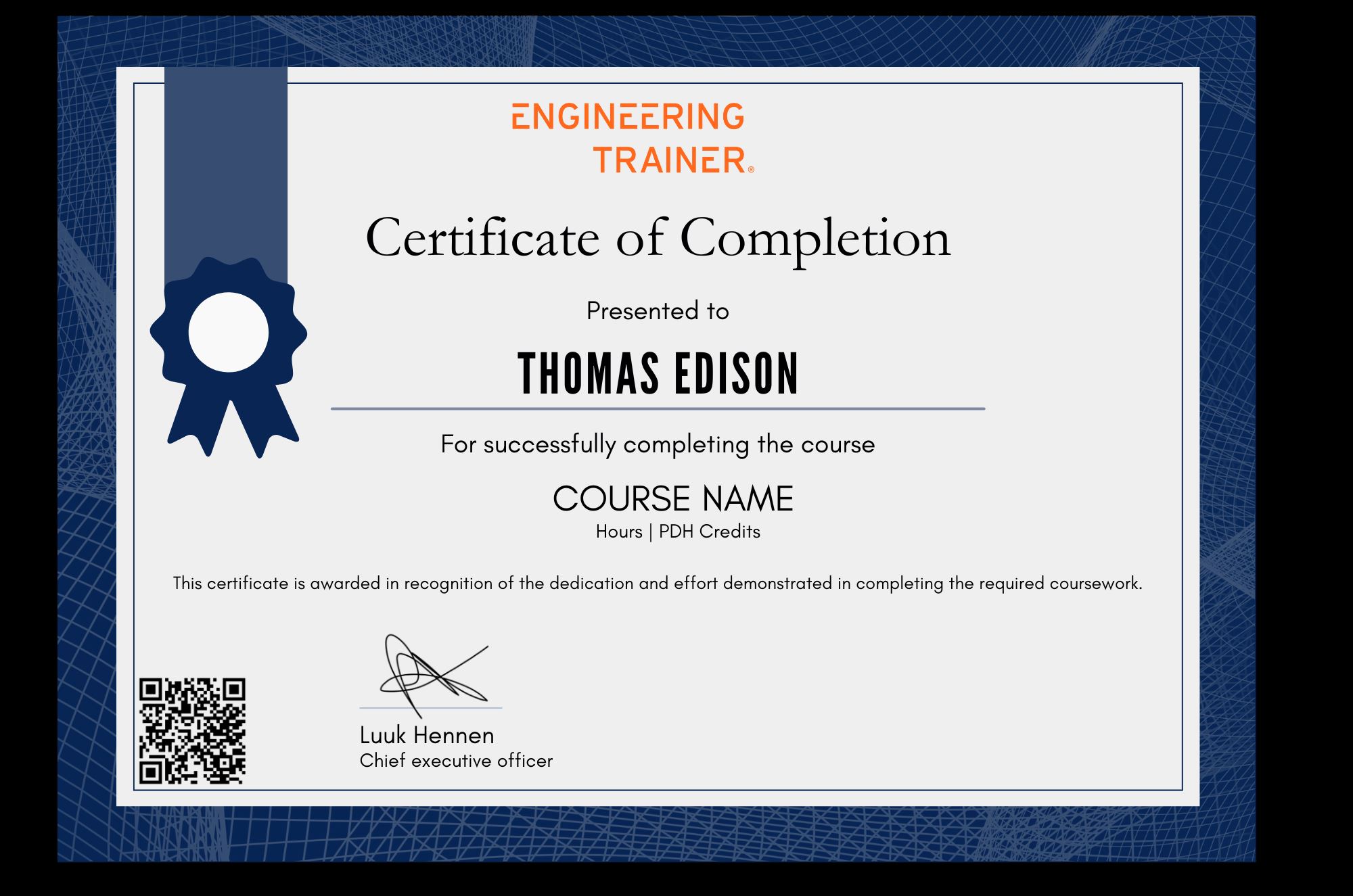

Why choose EngineeringTrainer
-
Unlimited Team-wide Access
-
Advance Technical Competences
-
Courses by Industry Authorities
Since using EngineeringTrainer our internal mentorship has a much more matured character.
Logan Chapman - COO at Chapman Consulting Inc.
Request a Quote
Train Smarter. Grow Faster.
Build real-world skills that help you make better engineering decisions, reduce errors, and stand out in your field.



